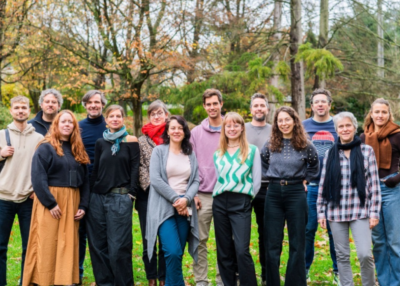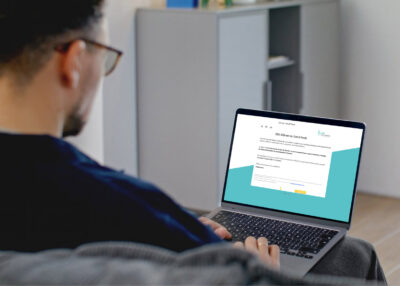
Exporting after COVID-19: our advice for the French market
The economy of Brussels is climbing out of a deep valley after coronavirus. Exports were hit hard and almost came to a complete stop. When is a suitable time to do business abroad again? What are the difficulties, challenges and opportunities for entrepreneurs in Brussels today?
We ask Marie Vanaerde, commercial attaché for hub.brussels in Rijsel and Nathalie Stefanovic, export manager at hub.brussels. Later in this article, we also gauge the reaction of Christophe Harou, co-founder of Generous, a Brussels biscuit factory with international allure. The rising demand from many (new) customers for local, high-quality and sustainable products fits in perfectly with his business model. And in the vision and approach of hub.brussels!
Interview with Nathalie Stefanovic, Marie Vanaerde and Christophe Harou
Do you have any tips or advice for companies wanting to start up their export activities again today?
Marie Vanaerde (hub.brussels): Make sure you are informed before you start again. There are still a lot of difficulties and barriers at this time for those wanting to re-export. Government measures on starting up again in France and Belgium, for example, are not always the same. This creates problems for economic life, for example, in the area around the border. For Belgian workers or employees who work in France, for example, or for the self-employed and interim workers who do not have a contract with their clients across the border.
There are also problems relating to taxation on teleworking, etc. Secondly, I would advise companies to carry out a thorough check as to whether your customer or distributor is financially sound. My third tip is invest in digitising your enterprise, both in terms of your contact with customers and for sales via a web shop. In northern France too, e-commerce has also been booming recently. Belgian web shops export 25% of their sales. France is the top destination with 28% of foreign on-line sales.
Are there good arguments for resuming exports today?
Marie Vanaerde: Recovery plans for stimulating consumption and investment are on the table in France in the aftermath of COVID-19. The French have saved about 80 billion euros in recent months. Loosening the coronavirus measures is vital for many sectors, such as the food sector, tourism, construction, etc.
Northern France has traditionally been an important economic crossroads and trade with Belgium is an important driver for the whole region: both in terms of imports and exports, Belgium is the region’s major supplier as well as customer. It is therefore difficult to underestimate the importance of trade between the two countries. Northern France is also an interesting test market for Brussels’ exporters, due to its proximity and language. And there is a great love for Belgian products and products from Brussels.
Do you see significant challenges in starting to export again?
Marie Vanaerde: What has certainly changed is the digitisation of contact and trade. E-commerce is becoming indispensable in the long term for many traders. I’m also expecting some changes in consumer behaviour. Supply will therefore have to adapt to demand. And last but not least, we will have to gain the customer’s trust again by taking the new health and safety measures into account as much as possible.
How are hub.brussels’ Commercial Attachés and Area Managers responding to the changed situation for exports during and after the coronavirus crisis?
Marie Vanaerde: We’re getting a lot of questions today from companies in Brussels. About logistics, funding, government measures, canvassing, etc. We support each exporter individually by providing them with customised information.
Nathalie Stefanovic: Area Managers are currently working on joint solutions and alternatives, such as webinars or virtual missions and contact days. They are getting companies to gather thematic information and to establish and maintain international contacts without having to invest a lot of resources. At the same time, we are exploring new original lines of thinking for the trade fairs that have been cancelled. And we are looking at how we can safely organise a joint stand in the future. As at the SIAL food fair in Paris planned for October.
Generous: Brussels’ biscuit factory is back in town
Christophe Harou is a co-founder of Generous, an artisan biscuit factory in Brussels. His company has also suffered greatly from the coronavirus and its associated measures. Exports in particular, which account for 40% of its turnover, were hit hard. Meanwhile, activities have been starting up again little by little…
How difficult has it been to keep things going in recent weeks? Have you kept producing and exporting the whole time?
Christophe Harou: Our production was shut down for two weeks. Sales and exports were severely hit. A lot of orders have been cancelled because most of our retailer clients had to close their doors. Ditto for exports to Spain and especially France, which came to a complete standstill. In addition, we import ingredients from suppliers from Lombardy, the region in Italy most affected. We had regular contact with them, and luckily the deliveries have been able to continue as planned.
What did you learn from this crisis?
Christophe Harou: April was very difficult. The uncertainty and the lack of clarity in particular about how long the measures would last gave us a lot of headaches. Which doesn’t mean that we sat still. We always tried to adapt to the rapidly changing context. The crisis forced us to reorganise and reinvent ourselves in a short space of time. With teleworking and video meetings, more tasks with a smaller team, wearing face masks, adhering to the rules on physical distancing, etc. I have to say: government guidelines and measures have always been communicated properly and clearly, hub.brussels, the social secretariat, etc.
How’s it going now with starting up activities again?
Christophe Harou: Cautiously. We have started production again on a limited scale. Some of the staff are now coming back from being technically unemployed. Trade with Spain came to an abrupt halt, but is now the first to get going again. Switzerland is slowly starting to be successful again. However, exporting to France, our largest foreign customer, is still particularly problematic at the moment.
But I’m an optimist by nature. This means that we as a company have to respond to new challenges, such as digitisation and a different sort of contact with customers. I can also see changes in the pattern of consumption. Perhaps the consumer now wants to spend more on high-quality, locally made, fair and sustainable products? That would be good news for Generous, because it fits in perfectly with our philosophy!
Exporting to Europe? Contact Nathalie and Thomas!
Nathalie Stefanovic
Export Promotion Coordinator - EuropeT. +32 490 49 35 34
nstefanovic@hub.brussels
Thomas Dupan
Head of Business Unit ExportT. +32 2 800 40 09
tdupan@hub.brusselsMore news

After Audi: Brussels foreign trade in the first half of 2025
Posted on 28/01/2026
